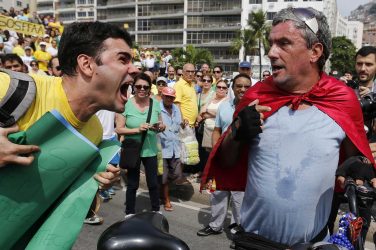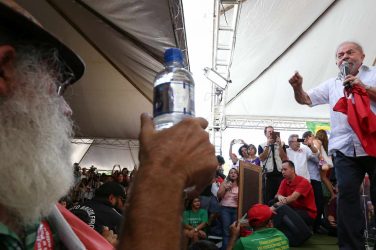Brazil’s leader of the Workers Party (PT) in the Senate, Gleisi Hoffmann, from the state of Paraná, was elected to the presidency of the PT with 69% of the votes of the delegates that participated in the 6th National Congress of the PT.
Hoffmann, who was the first woman elected to that position should lead the party for the next two years, even though she has been indicted for corruption in the Car Wash (Lava Jato) investigation.
The PT meeting, which lasted three days, from Thursday to Saturday, was expected to officially nominate former President Luiz Inácio Lula da Silva as its presidential candidate for the 2018 general election. But this did not happen.
The party’s congress opened with calls for free, democratic elections. A slide show featuring images of the late Venezuelan President Hugo Chavez, Che Guevara, and other revolutionaries, accompanied those calls.
Party affiliates, more than 1,000 during the congress opening, reiterated their unity in the face of a government plagued by seemingly endless scandals and corruption.
Party members have discussed strategies to overcome what they see as the dangers to democracy presented by current selected president Michel Temer and his administration.
“I have my candidate. My candidate is Lula!” said Dilma Rousseff, former Brazilian president who was ousted due to what many describe as a parliamentary coup.
Key architects of her removal such as Eduardo Cunha, former speaker of Brazil’s lower house of representatives; Aécio Neves, former congressman, and Temer himself have been denounced for receiving bribes, approving bribes, their involvement in a slew of corruption scandals, and other crimes.
Lula’s Message
Speaking at the opening of the congress, Lula said: “They want to convict me for everything that I’m proud to have done,” adding, “I’ve already proven my innocence.” Brazil’s former popular president concluded by saying, “The time has come to end the foolishness. This country can’t take any more destruction.” Lula also said that his main goal is to “prepare the PT to return to govern Brazil.”
Luciano Santos, president of the Communist Party of Brazil, repeated his support for the coalition uniting his party and the PT, Rural Landless Worker’s Movement, Central Worker’s Union, and Brazil’s Popular Front.
“A program with solutions for this country must come from here, one that can be discussed in each factory, in each square, in each street, in each school,” noted Lula. He exhorted his colleagues to prepare themselves to face off with and defeat their political and class enemies.
Lula stressed that if their program and ideas are well articulated and leave the halls of the congress and permeate throughout the streets, the PT would win the presidential election in 2018.
He added that his main goal is to “prepare the PT to return to govern Brazil,” as he reflected about the first decade of the 21st century, a period in which he governed Brazil, which saw a great social inclusion in the country.
A study conducted by the technical director of the XXII National Forum, Roberto Cavalcanti, and undertaken by the National Institute of High Studies, revealed that between 2001 and 2008, Brazil’s Social Inclusion Index grew, on average, at 5.3 percent per year. During that same period, the gross domestic product, per capita, grew, on average, at 2.3 percent.
Lula also mentioned how the corporate media has systematically sought to massacre the image of the PT and destroy the party as a whole. However, he told his colleagues not to worry about the trumped up judicial cases that have mounted against him, saying that he had already “proved his innocence” and that now he would demand that his accusers “prove his guilt.”
Diplomats Call
Further cementing the widespread opposition against the President from diverse sections of the Brazilian public, an open letter signed Thursday by over 100 Brazilian diplomats condemned the administration of Michel Temer, and called for immediate direct elections for a new president.
The letter expresses concern that the “significant achievements” of democracy in Brazil are under threat by the crises surrounding the Temer administration, his refusal to step down amidst ongoing protests and investigations, and the use of state force to suppress dissent.
“We call on Brazilian society, especially its leaders, to renew their commitment to a constructive and responsible dialogue, calling on all leaders to avoid authoritarian temptations, conveniences and personal or partisan attachments for the restoration of the democratic pact in the country,” an excerpt from the letter says.
“Only this way will it be possible to resume a new cycle of development, legitimized by popular vote and in harmony with the ideals of social and environmental justice and respect for human rights,” the letter continues.
The letter signifies the deepening of opposition to Temer, whose popularity is now in the single digits. Mass movements, workers unions, and government officials alike have called for the holding of free and democratic elections, to which Temer has only dug in his heels in response.
President Temer, who took power last year after his predecessor Dilma Rousseff was removed in what many call a parliamentary coup that allowed the circumvention of elections, has been deeply unpopular and widely protested for his administration’s corruption scandals and implementation of deep austerity measures.
“We reject any restriction on the free exercise of the right to peaceful and democratic protest. We reject the use of force to suppress or inhibit protests. It is up to the State to ensure the safety of demonstrators and the integrity of public assets, taking into account proportionality in the employment of police forces and respect for constitutional rights and guarantees,” the letter states.
Under his administration, and encouraged by the International Monetary Fund, significant cuts have been made to social security and pensions, among other public services.
In the midst of already declining popularity, a tape was leaked which recorded a conversation in which Temer can be heard giving his approval to bribes.
Following widespread mass protests, the initiation of a corruption investigation, and calls for his resignation, Temer reiterated that he would not be resigning from the presidency.
In response to escalating protests, Temer ordered the military to respond, and several dozen protesters were injured as a result.
Music Against Temer
After a mass concert in Rio where over 150,000 converged to say “Temer Out” and demand free elections, another mass concert is set for São Paulo this coming Sunday.
Several bands and artists will perform free of charge to demand, once again, “Temer Out” and immediate democratic elections. The event is scheduled to take place at the Largo da Batata.
Artists such as Emicida, Criolo, Mano Brown, Péricles, Tulipa Ruiz, Maria Gadú, Rael, Otto, Simoninha, Tarado Ni Você, among others are scheduled to perform.
Independent Carnaval collectives will also perform at the concert. These groups include Arrastão dos Blocos, Agora Vai, Jegue Elétrico, Bloco Bastardo, Saia de Chita, Vai Quem Quer, Cacique Jaraguá, Pitbull Banguela, Treme Treme and others.
“It’s impossible for Carnaval to exist without democracy and it’s impossible to have democracy with the policies that this illegitimate government has underwritten. This is something that has greatly mobilized the Carnaval blocs so as to take action and make our space a voice for those who are outraged by the current situation,” said Lira Alli, a member of Arrastão dos Blocos, one of the event organizers.
The organizers emphasized that the Brazilian Congress is rife with members involved in scandals and that none of them have the moral standing to “determine the future of the country.”
This past Sunday, artists such as Mart’nalia, Mano Brown, Bola Preta, Caetano Veloso, Teresa Cristina, Milton Nascimento and others, entertained hordes of people on Copacabana Beach while demanding an end to Temer’s presidency and free, democratic elections.
Bzz/teleSUR











